MSI GT70 Review: GTX 880M Edition
by Jarred Walton on April 16, 2014 6:00 AM ESTMSI GT70 LCD Quality
I noted earlier that the GT70 display is merely “okay”, and here’s where you’ll see why I have such a mediocre opinion of the panel. It actually delivers good colors overall once you calibrate it, but out of the box the colors are horribly skewed towards the “cool” end of the spectrum, with highly oversaturated blues. I used our tablet display testing workflow to gather this image, showing a relative representation of what the colors on the GT70 look like out of the box compared to what they should look like (the "desired color" is on the bottom). Most devices you’ll see minor differences, but the tinting of the various colors is extremely noticeable on the GT70:
I’m not quite sure why so many displays have such inaccurate colors, but my best guess is that in order to hit higher maximum brightness values (e.g. 350 cd/m2 – or “nits” if you prefer), the LCD panel makers are just pushing the LED backlights as hard as they can. Most seem to end up with very blue tints, and rather than correct that via the LUTs and end up with a lower maximum brightness value, we get poor colors.
It’s not just the colors that are disappointing on the GT70 display, though. With tablets helping to pave the way, people are becoming more knowledgeable about display quality, and the poor viewing angles of TN panels are finally earning the scorn of consumers they deserve. Most Ultrabooks are now using IPS (or similar technology) panels, and while I don’t necessarily feel every laptop needs a high quality display, it’s pretty sad when $400-$500 tablets have substantially better displays than $2000 notebooks. Given the woes of Windows DPI scaling and the continuing lack of broad application support for High DPI displays, we may not need or want QHD or QHD+ panels on a 15.6” or 17.3” notebook, but a slightly higher quality 1080p display would certainly be nice.
Below are the galleries and charts for uncalibrated and calibrated colors on the GT70. We’ve switched our LCD testing to use CalMAN 5.3 with an i1 Display Pro spectrometer, which gives far better results than our previous testing using ColorEyes Display Pro with an i1 Display 2, so we can’t really compare older scores directly with the new results. However, the brightness, contrast, and gamut should all be within a few percent regardless of which testing method was used. What we see is that the MSI GT70 is at least a better display than the budget TN panels, but it’s definitely not one of the top displays these days. That’s not too surprising considering the actual panel appears to be the same as in previous GT70 notebooks, which means it’s now at least a few years old in terms of the core technology.
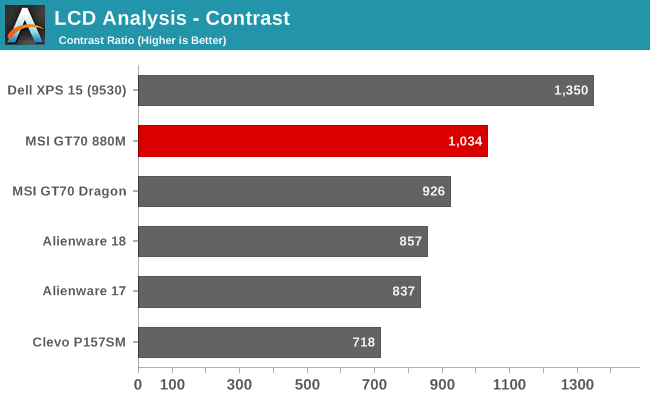
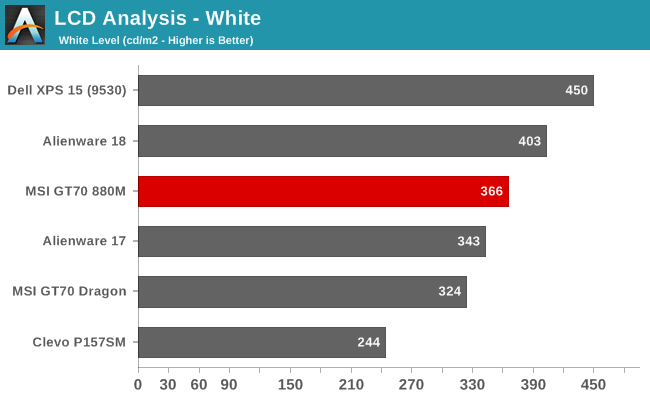
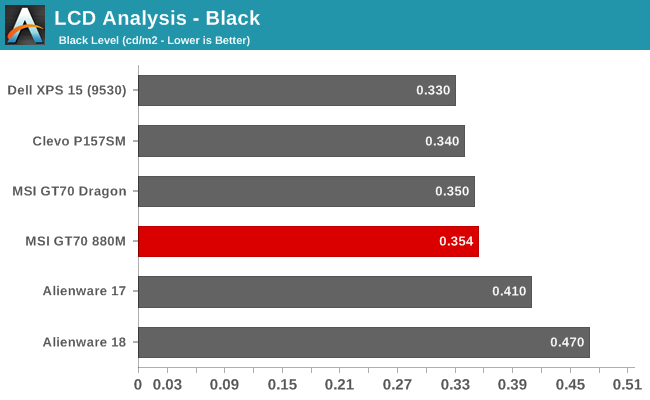
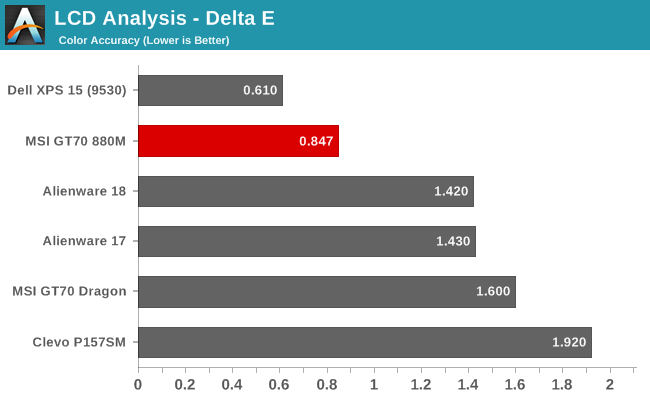
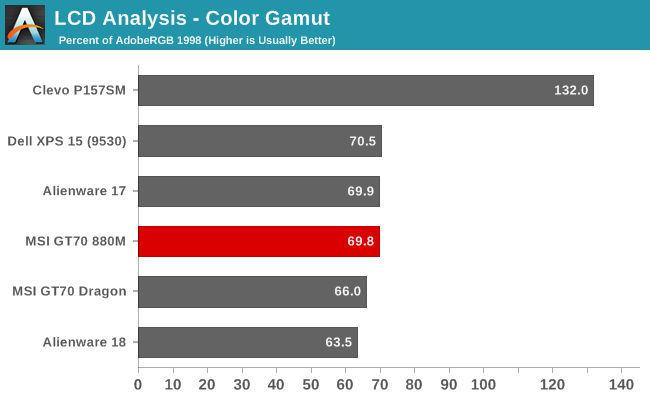
Overall, the display in MSI’s GT70 is certainly better than what you’ll find in budget notebooks and it will work well for gaming, but if you prefer higher quality displays you might just need to wait for the next round of updates and hopefully well see some IPS/AHVA/PLS or some other similar technology start showing up in the gaming notebooks. The colors can be calibrated to the point where they're quite good, but out of the box the display doesn't look very good at all.
















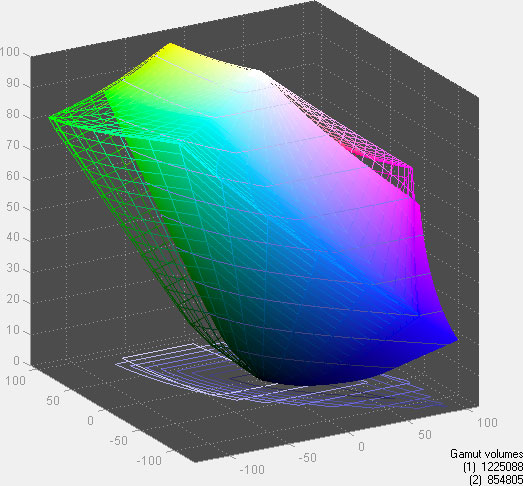








61 Comments
View All Comments
JarredWalton - Wednesday, April 16, 2014 - link
Crap... I could have sworn it had an IPS panel. Edited text, as you're right -- still TN. Does any 17.3" gaming notebook with PLS/IPS/AHVA exist right now? I've seen good displays in stuff like the EliteBook series, but those are apparently very expensive.pmpysz - Wednesday, April 16, 2014 - link
There's some new MSI notebooks with 3K screens. I think those are all versions of the GS60 and GT60s. There's also a 13.3 or 14" Eurocom model with a 1080p and 3k option. Then I saw a couple Gigabyte models with 1080p IPS in both 13" and 15" models. I think the 13" (P34G maybe) has newer 800 series, while the 15" doesn't, but will come out with a 800 series version soon. This is all off the top of my head though, so it might not be perfectly accurate. I personally really wanted an IPS ans the response time isn't as important to me as the image quality. I looked at the G750 at Best Buy and the TN panels look like garbage compared with everything I own. I really like the notebook, but no IPS really kills it for me.pmpysz - Wednesday, April 16, 2014 - link
*just to clarify, the 3Ks are all IPS AFIAK.rolla94 - Wednesday, April 16, 2014 - link
It is worth noting that the GT60 version uses what seems to be a Samsung PLS panel. I would be curious to see how the two panels compare. This is what I'm seeing on my GT60 Dominator 424 "SAMSUNG 156HL01-102"pmpysz - Wednesday, April 16, 2014 - link
Do all the GT60s use PLS? I've been curious as to what eDP wide angle means on some of the model descriptions. A quick google wrote it off as the same as TN, but I don't see how they can call TN wide anything.anactoraaron - Wednesday, April 16, 2014 - link
You guys going to get anything from a custom builder boutique based on the clevo w370ss chassis? That seems to hit a good price/performance point. Most boutique places are offering a free i7-4810 upgrade and I'm really wanting to see the 860m in some real world numbers.Hrel - Wednesday, April 16, 2014 - link
I don't think SSD's are as dramatic of a difference as you guys like to keep stating. Everything at work still uses hard drives. You launch everything and then just leave the computer on, with everything open, for weeks at a time. Once the programs are launched there's little/no difference between mechanical disks and SSD's. It's really not that bad.With that said when I power on the machine Monday morning I go make coffee cause I know it won't be usable for a few minutes. I think it's important to make that distinction, SSD is still just the difference between a "premium" experience and a normal one. The way most people use computers it's not a big deal. For anyone on a budget it's certainly not worth giving up meals over.
purerice - Wednesday, April 16, 2014 - link
I agree with you in the case of desktops. For laptops, however, the extra speed "can" increase battery life as well, or at least improve that portion of battery life where you are actually working. SSDs also weigh minutely less. Is that worth decreased capacity and extra cost?For you and for me, no, not really. For enough other people out there, yes.
JarredWalton - Wednesday, April 16, 2014 - link
I haven't really seen a major improvement in battery life thanks to SSDs (though it might happen in some cases). But the speed difference for launching apps, installing software, booting Windows, resuming from hibernate, etc. is very, VERY noticeable to me. Perhaps it's that I'm now used to having an SSD, so when I load Chrome and open my 30+ default tabs and it doesn't take a minute or two for everything to come up, I'm happy. Could I live without an SSD? Yes, but for the cost I'd much rather have a system with a good SSD and drop the CPU or GPU down a notch as opposed to having a maxed out CPU/GPU and no SSD.emarston - Thursday, April 17, 2014 - link
I disagree, if you require encrypted drives as my job does and SSD makes all the difference. Believe me I notice it on my work machine everyday.